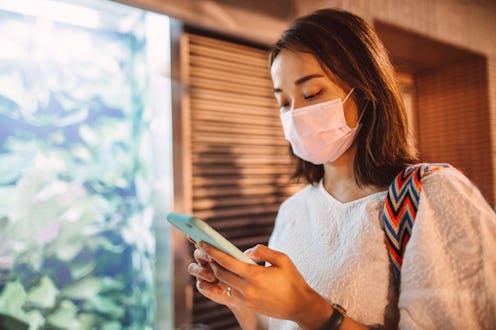Wellness
The Truth About Getting The COVID Vaccine If You Have Facial Fillers
Here’s what to know.

As warm weather trickles in and COVID-19 vaccines roll out, people are flooding their dermatologists’ offices for some injectables. Though Botox, filler, and other plastic surgery treatments boomed during the pandemic, derms are even busier these days as people increasingly venture out of their homes and want a little skin-smoothing zhuzh. But, as of late, rumblings of COVID vaccine and facial fillers reactions have left some hesitant to get their shots.
Studies have found very few people — people who each had dermal fillers — experience adverse reactions after receiving the COVID vaccine. That adverse reaction was swelling: Some had swelling at the site of their facial fillers (either the lips or cheeks), while others had swelling in other areas of their face. The swelling happened generally within 24 to 48 hours of getting the vaccine. (There have been no reports of side effects to the vaccine if you have Botox, BTW.) But, according to Dr. Roxanne Grawe, MD, a board-certified plastic and reconstructive surgeon, the swelling is simply a sign your body is responding to the vaccine.
“Getting a vaccine is supposed to make your body go into defensive mode,” she tells Bustle. “It causes your body to make different antibodies that can fight a virus, so it’s common to bring fluid to places throughout your body — that’s the way we bring healing cells somewhere.”
Board-certified dermatologist Dr. Adarsh Vijay Mudgil, MD, says the COVID vaccine has caused inflammatory reactions in a “very small subset” of people with filler. His take? “The vaccines are obviously so novel, so the more people that get the vaccine, the more idiosyncratic reactions we’re going to see,” he tells Bustle. “But the swelling [people with filler have experienced] has not been a serious reaction that caused anything permanent.”
With dermal fillers, you’re usually getting hyaluronic acid injected, which also pulls water, says Grawe. “If you’re having any kind of reaction and your body is getting ready to fight something, even if it’s a sinus infection, you tend to get a little swollen where you have filler because the hyaluronic acid is pulling water,” she says. If you get filler in general, without a vaccine in the equation, it’s common to experience some swelling. “It’s very normal to have a little swelling in the area [of the filler] for 24 to 48 hours afterwards,” says Dr. Whitney Bowe, MD, a board-certified dermatologist, adding that getting red tenderness after the vaccine is a very small risk.
Should You Get The COVID Vaccine If You Have Facial Fillers?
All dermatologists Bustle spoke with adamantly recommended that you still get the COVID vaccine if you have filler. And you can still get filler after you’re vaccinated, says Mudgil. But if you want to be extra careful, Dr. Shirley Chi, MD, a board-certified dermatologist based in Los Angeles, CA, recommends waiting at least one month after your second vaccine shot to get filler.
“All of the issues reported [of adverse reactions] were resolved with antihistamines,” says Chi. “You should be fine, and in the very rare case you have a reaction, it’s totally treatable and can be resolved with an over-the-counter antihistamine or prescription steroids.”
“But the swelling [people with filler have experienced] has not been a serious reaction that caused anything permanent.”
There have been zero cases of serious reactions — like difficulty breathing or a closed-up throat — to people with filler who got the vaccine. “Nobody had to go to the hospital — all took something like Benadryl or oral steroids and got better,” Grawe says. “We don’t know why some people may be more prone to swelling as an inflammatory response, but it’s easily resolved.” Mudgil echoes this: “I advise all of my patients who’ve had filler to get the vaccine — it’s not a reason to not get it, as there are no contraindication,” he tells Bustle.
Studies referenced:
InformedHealth.org [Internet]. Cologne, Germany: Institute for Quality and Efficiency in Health Care (IQWiG); 2006-. The innate and adaptive immune systems. [Updated 2020 Jul 30]. Available from: https://www.ncbi.nlm.nih.gov/books/NBK279396/
Munavalli, G. (2021). Oral angiotensin-converting enzyme inhibitors for treatment of delayed inflammatory reaction to dermal hyaluronic acid fillers following COVID-19 vaccination-a model for inhibition of angiotensin II-induced cutaneous inflammation. JAAD. https://www.jaadcasereports.org/article/S2352-5126(21)00137-5/pdf
Munavalli, G. (2021). COVID-19/SARS-CoV-2 virus spike protein-related delayed inflammatory reaction to hyaluronic acid dermal fillers: a challenging clinical conundrum in diagnosis and treatment. Archives of Dermatological Research. https://link.springer.com/article/10.1007%2Fs00403-021-02190-6#Sec7
Papakonstantinou, E. (2012). Hyaluronic acid: A key molecule in skin aging. Dermato-Endocrinology. https://www.ncbi.nlm.nih.gov/pmc/articles/PMC3583886/
Van Dyke, S. (2010). Severe Acute Local Reactions to a Hyaluronic Acid-derived Dermal Filler. The Journal of Clinical and Aesthetic Dermatology. https://www.ncbi.nlm.nih.gov/pmc/articles/PMC2922715/
Experts:
Dr. Roxanne Grawe, MD, a board-certified plastic and reconstructive surgeon
Dr. Adarsh Vijay Mudgil, MD, board-certified dermatologist based in New York City
Dr. Whitney Bowe, MD, a board-certified dermatologist
Dr. Shirley Chi, MD, a board-certified dermatologist based in Los Angeles, CA